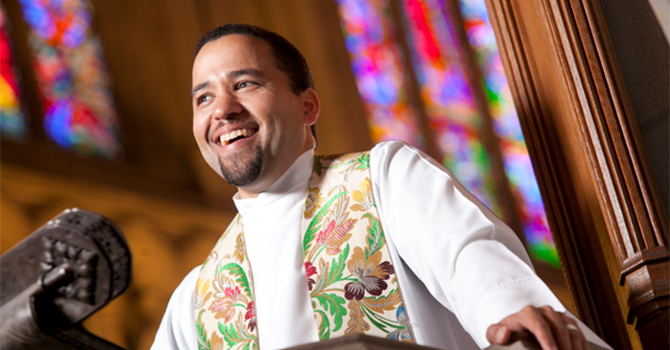Editor’s note: Faith & Leadership offers sermons that shed light on issues of Christian leadership. This sermon was preached Jan. 25, 2017, in Sweeney Chapel at Christian Theological Seminary in Indianapolis, Indiana.
“Your anger does not produce God’s righteousness.”
I cannot escape the grip of this verse. Does that ever happen to you? I once spent nearly a year with the story of Jesus raising Lazarus from the dead. Every time I thought I was finished with that story, something else called to me. It said, “Come back -- there’s more here for you, and you need every bit of it.” I did other things during that year, of course, but very few weeks passed that I didn’t wrestle with that story and allow it, sometimes begrudgingly, to wrestle with me.
It’s happened again with this short passage from the Letter of James, especially so with that one statement: “Your anger does not produce God’s righteousness.”
I didn’t choose this passage. It came to me one morning in a daily lectionary around the first of October, just as we thought the presidential campaign couldn’t get any crazier. And then -- get this -- the passage surfaced again, rather cruelly I would say, on the day after the election. Neither time did I choose the passage, but since I’ve lived with it now for nearly four months, I wanted you to have the chance to experience something of what this is like.
Forget the panels of pundits and the 24-hour news channels; this is all the commentary that was needed. Scripture had again read us more closely than we usually read it.
“Your anger does not produce God’s righteousness.”
The longer the campaign season wore on and the more people so cleverly stoked and redirected an already palpable anger, the more I wanted to use this verse as an indictment. Your anger -- the anger that is determined to tear people down and tear communities apart -- your anger does not produce God’s righteousness. Your anger, an anger that burns so hot that it can only be satisfied if others not only lose but are somehow destroyed in the process, your anger does not produce God’s righteousness. I wanted them to know that.
I should have taken to Twitter with this verse. Do you know you can write “your anger does not produce God’s righteousness” twice in a single tweet and have 45 characters to spare?
My indictment went something like, “Wake up, people! You are ripping this country apart with your exaggerated fears, your ideological bombast and your disingenuous quoting of the Constitution. None of these things produce God’s righteousness!”
And by the way, it’s wasted time to pin me or this sermon down to one candidate or one political party. I thought much of the campaign, regardless of what level of office was being sought, was an insult and an embarrassment, almost completely lacking in what President Lincoln called “the better angels of our nature.”
But using this verse as an indictment felt strangely -- and a little surprisingly -- unfulfilling. And while I grappled with that realization, I heard the verse say, “Your anger doesn’t produce God’s righteousness either!” I probably was the intended audience all along, or at least more a part of the audience than I wanted to admit.
The verse evolved from an indictment to a confession. I’ve spent the last few weeks trying to repent of the assumption that my anger is a little more righteous than everyone else’s, but it’s been hard. Very hard.
I confess that I too disregarded and compartmentalized things, especially as the campaigns heated up and the races tightened.
I confess that my anger also sought to settle some scores.
I confess that I did not listen well to messages that others sent in my direction.
Confession has a way of reining in self-righteousness. Perhaps it’s the kneeling. Or maybe it’s the acknowledgment that our finitude has caught up with us again.
And so I confessed. I confessed my eagerness to use this verse as an indictment of others. I confessed that I had begun too many sentences with the word “your,” when confession begins with “I” and “we.” And I have repented of the wrong that I have done and the wrong done on my behalf, which is a frighteningly broad category.
But the verse continues to evolve. It is not finally an indictment or a confession alone. It is also a calling. Hear James’ words again.
“Be quick to listen.”
Gordon Hempton calls himself a silence activist. He notes that we have evolved in ways that allow us to close our eyes, because, well, sometimes we have just seen enough. We also have the means by which to close our mouths, a challenging but doable feat. What we don’t seem to be able to do is close our ears. If we have the gift of hearing -- and some who do not are remarkable listeners -- but if we have the gift of hearing, we have to turn away from people or talk over them in order to stop listening. In other words, to be quick to listen is within our power to do if it is in our spirit to do.
I’ve already been listening. I’ve heard truth and things that maybe were once true but now have been mangled beyond recognition. I’ve heard facts and alternative facts and arguments about which are which and what those terms even mean now. Lies. Fake news. And then there’s my favorite category -- lies about fake news.
I’m going to be quick to listen. I’m going to listen for truth and goodness and let them have their say.
I’m going to listen more closely for the cries of pain and injustice and abandonment that call out day after day.
I’m going to be quick to listen for ways to bring people together in conversations that are mutually respectful and beneficial. Dictionary.com announced that “xenophobia” -- fear of the other -- was its 2016 Word of the Year. This is what we are up against, and it cannot be overcome unless, regardless of what anybody else is doing, we are quick to listen.
And I’m going to be quick to listen for how I can re-energize my lovers’ quarrel with this country. You know, the love of God and the love of country are different loves. We worship and adore God. We live in the awe and mystery of God, lost in wonder, love and praise, as the great hymn says, but our love of country is different. To give to Caesar what belongs to Caesar is to love enough to support when we can, to question when we must know more, to protest when the direction is wrong, and to demand action when our neighbors are forgotten and ignored. I’m going to listen for ways to grow my love of country so that it will do those very things.
And that means that I’m not going to withhold my appreciation when our leaders do well and do right just because I am not enamored with the ones doing it. I’ve watched partisanship and prejudice drive obstruction for too long in this country, and even if it’s just for my own sanity, I’ve got to try to be better than that.
Second -- again, I’m following James’ directions here -- I’m going to be slow to anger. James doesn’t say, “Don’t be angry.” We know of the appropriateness and value of anger in other places of Scripture and throughout the Christian story. James does not tell us to delay our anger or to defer it. And surely James knows that there will be surges in our anger when we encounter profound neglect and discrimination and brutality. Sometimes nothing short of rage will catch people’s attention and disrupt systems.
In this country, though, we tend to vacillate between an all-out fury and a distracted complacency. The anger that leads to God’s righteousness gets expressed daily in honest speech and truthful actions, in offering hopeful wisdom and concrete solutions, in consistently caring for people and places, in heeding the gifts and perspectives of a richly diverse country, in ensuring that no decision is final until it can be justified in the face of the hungry and the hurting among us.
Here we are told to be slow to anger -- not to cool off, not to take the tranquilizing drug of gradualism, but so that we get it right. We’ve seen what it’s like not to get anger right, tearing into each other and bringing to a halt the processes that are supposed to benefit us. To be deliberate in our anger allows us to focus it and calibrate it for the greatest positive impact.
People on every side are angry. We carry fear and anxiety and unresolved grief. This can’t go on, not with it aimed at each other, but if the needed and blessed anger can be directed and sustained at the real problems, then the life we share in this country might begin to exhibit signs of fairness and equal opportunity and even harmony.
A short-term test of anger is its power to elect certain people. The greater test of anger is its commitment to keep the heat on all our leaders and on ourselves to seize opportunities, meet challenges and try one more time to be the country that we tell the world we are.
Third, James makes it pretty clear that the ultimate aim toward which we are to expend life’s energies and talents is the righteousness of God. That is the standard. Stay focused on God’s righteousness. If our anger isn’t producing God’s righteousness, it’s time to recalibrate and redirect it so that it does.
January 20. My wife, Rhonda, and I were very excited. We had waited months for the day to arrive. We woke up early, much earlier than usual. That’s how excited we were, and we knew that many others were excited, too. It was worth the wait, because at 8:03 on Jan. 20, 2005, our daughter Maggie was born. She came to us that morning as a bright and beautiful light.
Now, why did I tell you that story? Well, this is why. I’ve seen a lot of Jan. 20s, more than most people in this room, less than a few of you. Some Jan. 20s have been better than others -- some a lot better than others, like the day our daughter was born. Some have held enormous excitement; others have held grave concern.
But there’s never been a Jan. 20 for God’s people when the highest calling was anything but embodying and enacting the righteousness of God.
That is our calling. The righteousness of God.
Isaiah says that when the righteous govern, it’s like streams of water in a dry place; it’s like shade in a weary land (Isaiah 32:1-2).
Jeremiah says that in the day of righteousness we will fear no more, so wise and just the leaders will be (Jeremiah 23:4-6).
Amos says that righteousness does not tolerate trampling on the poor and pushing aside the needy but loves what is good and just (Amos 5:11-15).
Righteousness chooses life over death and blessing over curse, day after day, for ourselves and for all of God’s children.
It is birthed in a God whose love for us and the whole world cannot be extinguished. It’s making room at the feast until everybody has a place. It’s the tender love of the neighbor and the tough word of the activist. Righteousness is our calling.
It gives rise to integrity and truthful speech. It brings people together to see the divine image in each other. It seeks accountability. It calls forth gifts and passions. And it makes possible what weary people are otherwise ready to give up on. Righteousness is our calling.
Whatever day the calendar says it is, whatever is going on that day, and however we may feel about that day and its events, this is our calling.
January 20 is one day, but I’m talking about another day, you know? I’m telling you about a different day here.
It’s the day the prophets point to, the day for which we are called, the day toward which all our days move. I’m talking about that day when justice rolls down like waters and righteousness like an ever-flowing stream.















